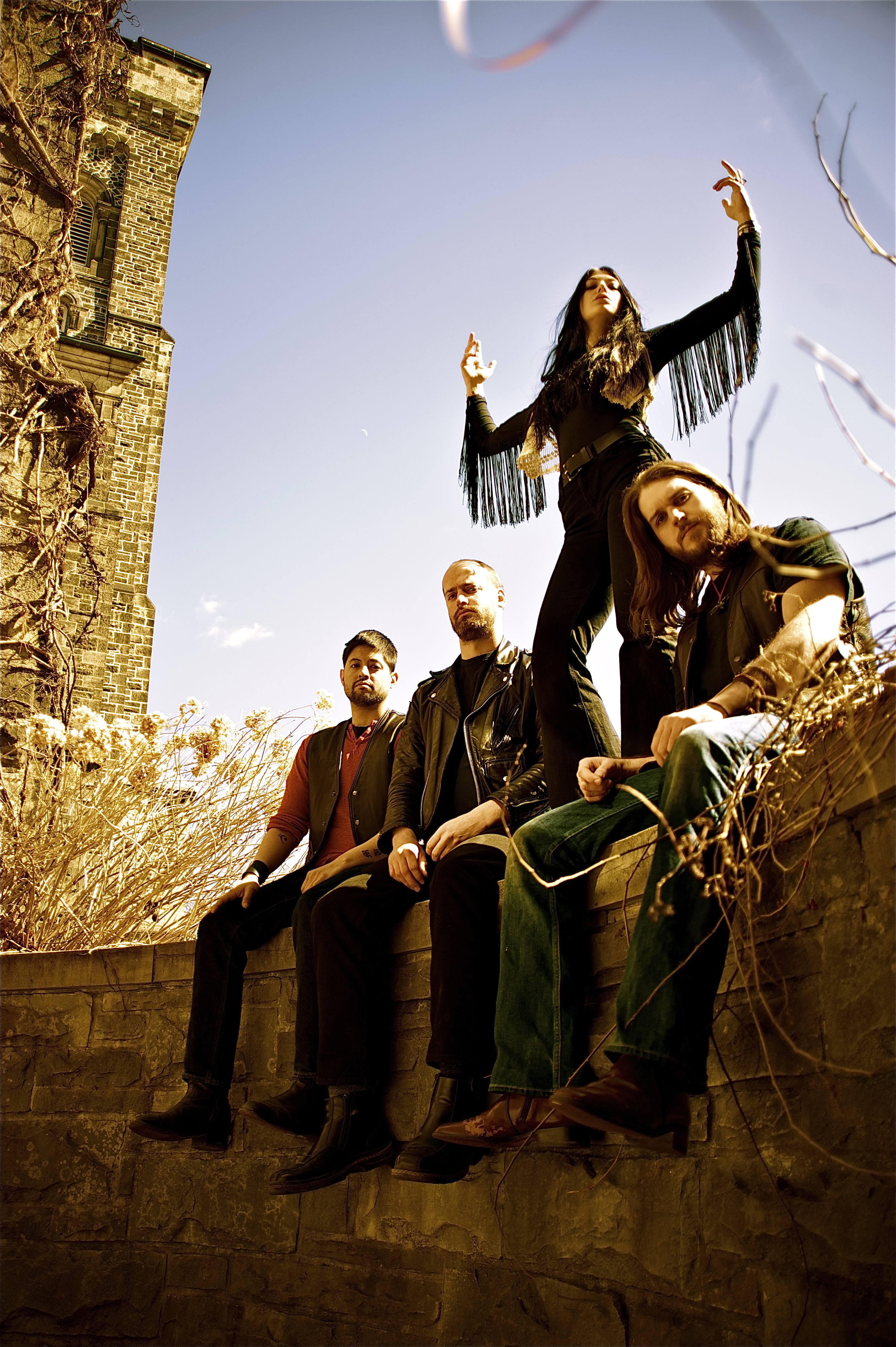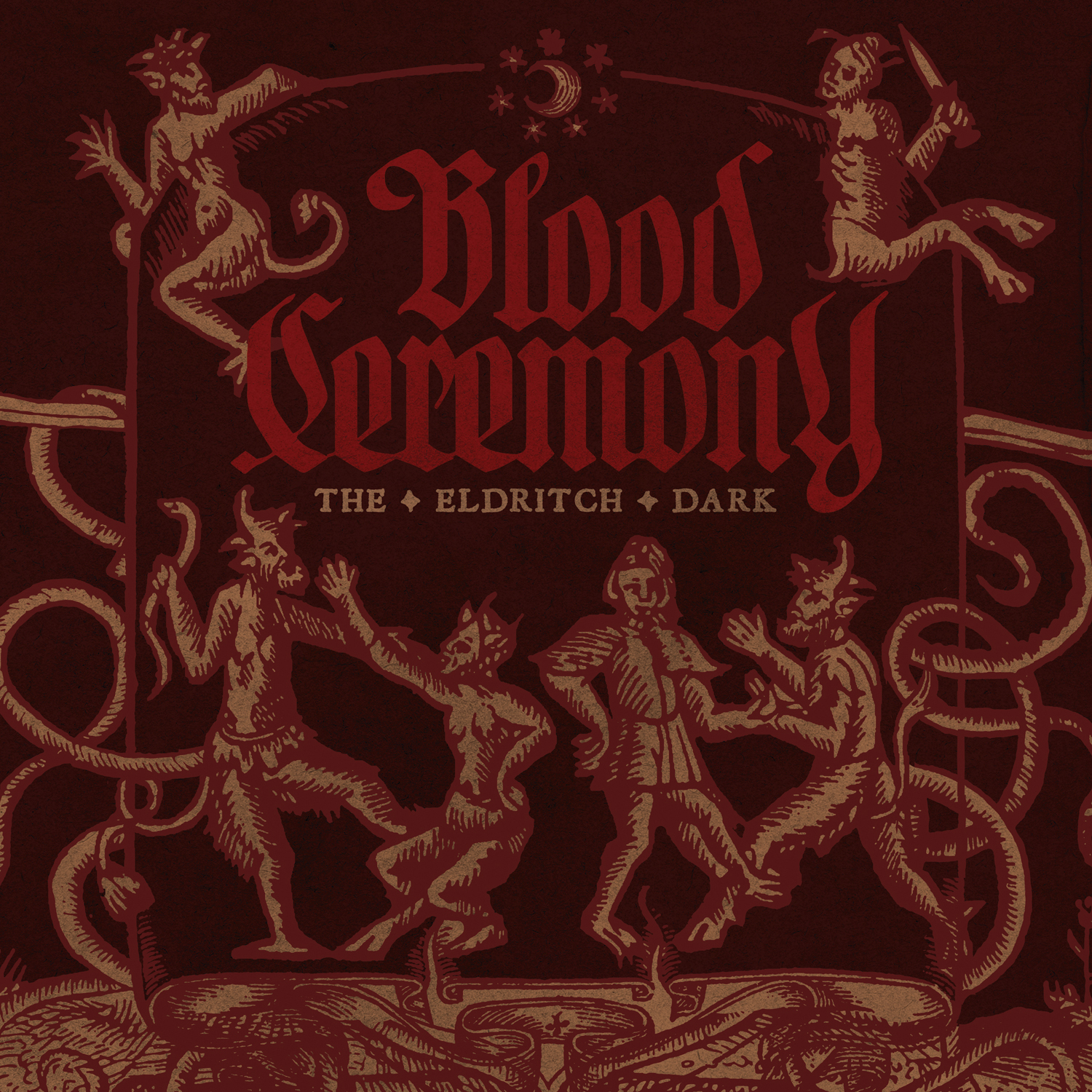Dancing in the Eldritch Dark: A Conversation with Blood Ceremony
The past five years have seen the gears of the machine behind Blood Ceremony turning with increasing velocity. Born in 2006 in Toronto, Ontario, Canada, the band released a self-titled record in 2008 that was re-released in a deft move by Metal Blade Records in 2011. Credited as being one of the most original bands in all of Toronto, Blood Ceremony returns this year with their third effort, the excellent and innovative "The Eldritch Dark." Here to explain the album, how it came to be and how the band started is bassist Lucas Gadke. Oh, and he drops some wicked classic horror titles, too.
M. DREW: You have a new album out, “The Eldritch Dark” (which is excellent, by the way.) Tell me a little something about it. How do you feel about it? What was your objective in writing it?
LUCAS GADKE: I can safely say that the rest of the band and I feel that this is our best work yet. First off, we have a new drummer, Mike Carrillo, who really brings a ton of power and groove to the band. We wanted to showcase the band, playing live in a room, live off the floor. The new songs were so strong that we wanted to lay them bare with minimal overdubs. The writing is a continuation of our previous themes: black magic, the pagan world and tales of darkness and mystical realms. We also wanted to showcase our ear for tight arrangements. Sean is the primary writer, but we all share in the arranging duties, working the songs down to a tight composition.
M.D: What’s new on this album that people who have followed your career to this point haven’t heard before? How has the music on this record evolved out of the previous two?
LG: Probably the most surprising thing on the album is the male lead vocals on “Lord Summerisle,” which I sang. Alia has always handled lead vocals and we thought this was an interesting twist to our sound. I think we've evolved as performers. We tracked the album to tape and did the majority of it live in a room, with minimal overdubs. What people will hear on “The Eldritch Dark” is a band playing in a room. The production is old-school, but we weren't intentionally going for a "vintage" recording. We were trying to record a classic sounding album.
M.D: Your lyrics are always interesting, for lack of a better term. From where do you take lyrical inspiration? What are the themes that appeal to you?
LG: Sean is the lyricist. He is an avid reader. Mostly, we look find inspiration in weird fiction writers like Clark Ashton Smith, H.P. Lovecraft and Arthur Machen. We look for music and lyrics that create an intense mood, whether that be dread, wonder, or numinous power. People tend to think we are satanists, and while we have a few songs that reference the devil, we are far more interested in pagan themes. We aren't really pagans either, but these old themes inspire us.
M.D: The band has mentioned in past interviews that Blood Ceremony’s unique sound is a product of the members’ different influences – can you expand on what those influences are and how you manage to make them blend?
LG: I'm probably the biggest metal head in the band, and I'm always pushing us towards the doomier side of things. Alia, is the queen of prog, with a library of European prog bands in her record collection. Sean is really into Brit-folk and prog from the late sixties and early seventies. Sean, being the main songwriter, brings his tune in and we add in our own elements, taking a part and making it more prog, or more plodding as the song demands.
M.D: When writing songs, how do you keep track of all the elements that must be orchestrated? What gets laid down first, and then how do the pieces come together?
LG: Sean will usually bring a tune in with the words, chords and ideas for a vocal melody. From there we just play the song, stop and problem solve. On this record especially we jammed a lot, recording what we were doing and keeping any good ideas that come up. From there, it's pretty open to suggestion and rearrangement, moving and cutting parts. We knew early on that we wanted to do a short compact album, one LP, so most of my attention was directed towards cutting the fat. Dropping a beat here, cutting a bar there, working down the songs until they feel like the move under their own power. When a song feels effortless, it's done.

M.D: How did Blood Ceremony come to be? What’s the band’s origin story?
LG: Sean had the vision for the band back in 2005. Alia was actually originally brought on just two play flute, but then the singer moved to India! This proved to be a stroke of luck as Alia, over the years before the release of the first record, became a one of the most powerful performers I had ever seen. I actually joined the band in 2010, and before that I was a huge fan. I threw my back out head-banging at the Reverb in Toronto. I actually met Sean in a bar one night after I'd had a stupid fight with my ex-girlfriend. I was a pretty lubricated and I got up the courage to ask him point blank that I wanted to bee in the band. About two days later I was asked to jam with them.
M.D: A lot of people have tried to use clumsy descriptors to quantify your music – in your own words, how would you define your sound?
LG: We are a heavy rock band. People like to call us doom metal, flute metal, or female-fronted witch rock. I'm happy with whatever descriptor you want. All those terms are used for is to tell your friend about a band, and if you pass it along and they check us out, they can slide us into whatever genre they want to. We'll continue to make the music that happens when we all get together.
M.D: When talking about Blood Ceremony, it feels like too many media outlets are content to say “they sound like Black Sabbath” and leave it at that, which I think is totally unfair to the variety of your sound (compliment though it may be.) Do you pay any attention to that, and perhaps on the other side, do you feel like that’s a wholly fair depiction?
LG: We love Sabbath, and I think you could say that about almost every band in the "metal world" that's not black or death metal. Once again, it's just convenient descriptors between friends and journalists. Listen and decide for yourself.
M.D: Do you feel like you have to do anything extra to appeal to a Rise Above/Metal Blade audience that may not typically be looking for flute-infused rock? Is that even something you consider, or do you have confidence that the music will find the right fans?
LG: The gods are with us and we do what we want.

M.D: In the last couple years, we’ve seen a huge comeback by ‘traditional’ metal and other brands of hard rock. What do you think is bringing its popularity back around? Do you think it’s a reaction to metal at large becoming more ‘extreme’?
LG: Cultural trends ebb and flow. I don't think there's any clear narrative in taste making in a niche market like heavy rock/heavy metal. Some pretty extreme bands are getting a lot of attention, and rightfully so. If I didn't look know any better, paying attention to what I do, I'd think that all bands are going for the Incantation sound like fellow Canucks Antediluvian and Adversarial. I'm happy to see a lot of bands pursuing a more traditional sound. Maybe this is just a good generation for songwriters who love heavy music.
M.D: Most of the bands coming out of Canada in the recent surge are either crossover hardcore or straight up death metal, yet you’re totally different. How did you stand out from the crowd on the home circuit?
LG: Canada, and Toronto, in particular, has a very diverse scene - indie rock, world music, rock, death metal, hardcore. Every band stands out when you look at like that. We tend to think of ourselves on a more international scale. We love Canada and can't wait to play Vancouver, Regin and Winnipeg which are new towns for us! But [we] don't think of ourselves as a Canadian band; rather, more as a band from Canada.
M.D: I must ask given your themes, are you or the other members of Blood Ceremony horror movie fans?
LG: Sean is an official buff. His bedroom is filled with stacks of VHS and DVDs. We are all really into old school 70s horror flicks. I'm not much of a cinephile, but if I'm watching something, there's usually someone running for their life in it.
M.D: By way of a follow up, what themes or subgenres appeal to you? Have you ever taken songwriting inspiration from horror cinema?
LG: Euro-horror and Hammer are the main filmic inspirations: we love anything Paul Naschy, Jess Franco and Jean Rollin, especially. Some standouts for us are “Horror Rises From the Tomb,” “Psychomania,” “Horror Hospital,” “Living Dead at Manchester Morgue,” “Eugenie: the Story of our Journey into Perversion,” “Blood From Satan's Claw,” “The Devil Rides Out,” “Vampire Circus,” etc. etc. The list goes on and on. Basically, anything with a heavy Euro-gothic atmosphere and insane scripts. A bit of humour mixed with the horror always appeals too as with Polanski's “Fearless Vampire Killers” and Paul Morrisey's “Blood for Dracula.” The main songwriting inspiration comes from trying to write songs that match the otherworldly vibe of these types of thrillers.

